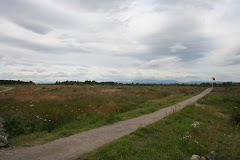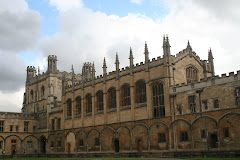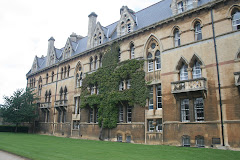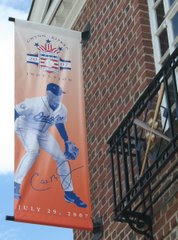The weather is unseasonably delightful. Ordinarily, the temperatures and humidity levels are a bit higher during the first week of July. Not so this year. Air and water temperatures are nearly identical, mid-70s. Very nice.
It's been a relaxing week. Sleeping in. Reading. Listening to music. Playing music -- there was no room in the car [Lisa, me, Patrick and his friend -- Molly is in Bath, England for another week yet; she has been there for the past month] for my guitar, so I brought along my practice chanter to work on pipe tunes. Staring at the sky. Staring at the sea. Taking brisk walks.
I've completed Scheer's book. Early on Scheer states, "Contemporary worship music will not revitalize my church, contemporary worship music will not revitalize my church, contemporary worship music will not revitalize my church." Scheer goes on to encourage a solid assessment of any given congregation. His questions include: Do the people need new music? Who makes up the congregation, and are they being represented musically? Does any proposed change in music come from the people?
Scheer covers a lot of familiar ground regarding institutional change -- innovators (2%), early adopters (18%), middle adopters (60%), late adopters (18%), and never adopters (2%). He also covers well-worked ground contrasting modernism (knowledge) and postmodernism (experience). Modernity has ruled for the past two centuries, more or less. Postmodernity currently rules the roost, more or less.
Scheer is a good analyst of worship traditions. He delineates between liturgical worship, thematic worship, and experiential worship. In liturgical worship, preaching and the sacraments take front and center stage. In thematic worship, everything leads up to and flows from preaching. Experiential worship is primarily music driven where the worshipper's response is of utmost concern.
Scheer's argument for blended worship is a compelling one. He discusses Martin Luther's reviving the Roman liturgy with vernacular language and common musical styles. Scheer notes that "too much vernacular influence may allow the medium to overwhelm the message, but rigid adherence to perceived historical purity may drain worship of its lifeblood." [p.98] One of the more useful pieces of information I have taken away from Scheer's book is this: "For most churches, the wisest decision is to find a place on the spectrum that gives voice both to the people in the pews and to the saints who gave gone before, giving worship both relevance to modern culture and roots in tradition." [p.98]
Also, Scheer has a great segment in his book on informing your ear musically. As a Beatles fan -- Paul turned 64 this year -- I was thrilled to read: "If I had to recommend one band that would best train the worship leader's ear, it would be the Beatles. Over their career they explored an incredible range of styles, sonorities, form and harmonic languages. Nearly everything done in popular music today has a precursor in the output of the Beatles." [pp. 167-168]
To everyone who has left a comment, thank you. Your words inspire me to be faithful to this blog.
That's it for the moment. Peace.
Tuesday, July 3, 2007
Subscribe to:
Post Comments (Atom)
Links worth visiting
- Dan Kimball's website -- Dan is author of The Emerging Church and pastor of Vintage Church, Santa Cruz, CA
- Calvin Church, Zelienople, PA
- Calvin Institue of Christian Worship
- William and Mary's DOG Street Journal
- Brian McLaren's hompage -- author, speaker, activist
- Isabella Stewart Gardner Museum, Boston, MA
- JFK Presidential Library and Museum, Boston, MA
- My writing instructor at Oxford's Summer School
- Homepage for Oxford University's Oxford Experience
- Simon Fraser University Pipe Band
- One of the guitarists with whom I studied in Maryville
- For the bluegrass music fan with details about the bluegrass guitar camp I will be attending
- Montreat: The starting point for hiking western NC's Blue Ridge wilderness
- For citizens of Red Sox Nation
- My home and place of study while in Glasgow, Scotland, UK
- Here's the site of the bluegrass guitar camp in the TN Smokies
- Take a virtual tour of Cooperstown's Baseball Hall of Fame
- Barnwell Inn: My B&B home away from home in Cooperstown, NY
- First Presbyterian Church, Winchester, VA, USA





















2 comments:
Dan,
Larry and I fished the Rose on Monday. It was beautiful day, but hard work. Water was warm and low. We managed to pull out a few Brookies, I even got a 7" one.
We spent Tuesday on the Shenandoah and caught lots of little fish, no Bass. I managed to flip our canoe. I thought it was fun, Larry tried not to get mad. We thought of you. Peace,
Rossi
Hi,Dan-
This was an interesting post. I plan to read the book.
Thanks, and best wishes to your family,
Nancy Chambers
Post a Comment